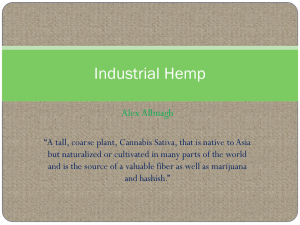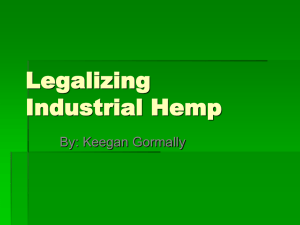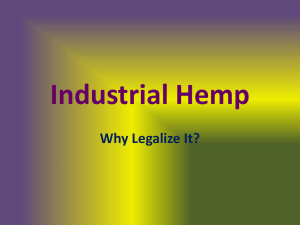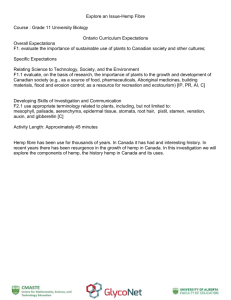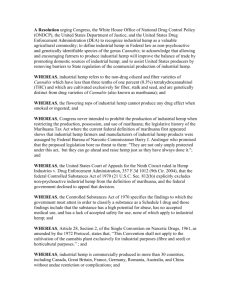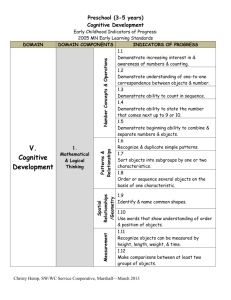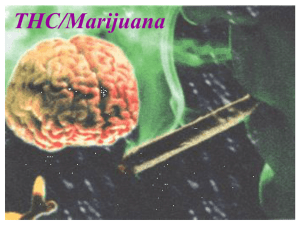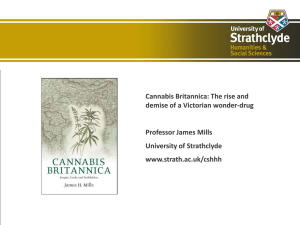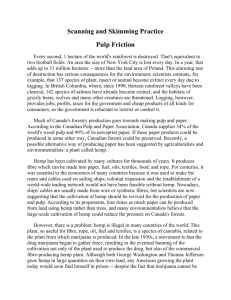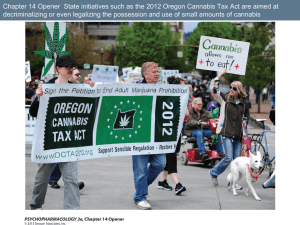tasmanian industrial hemp position statement
advertisement
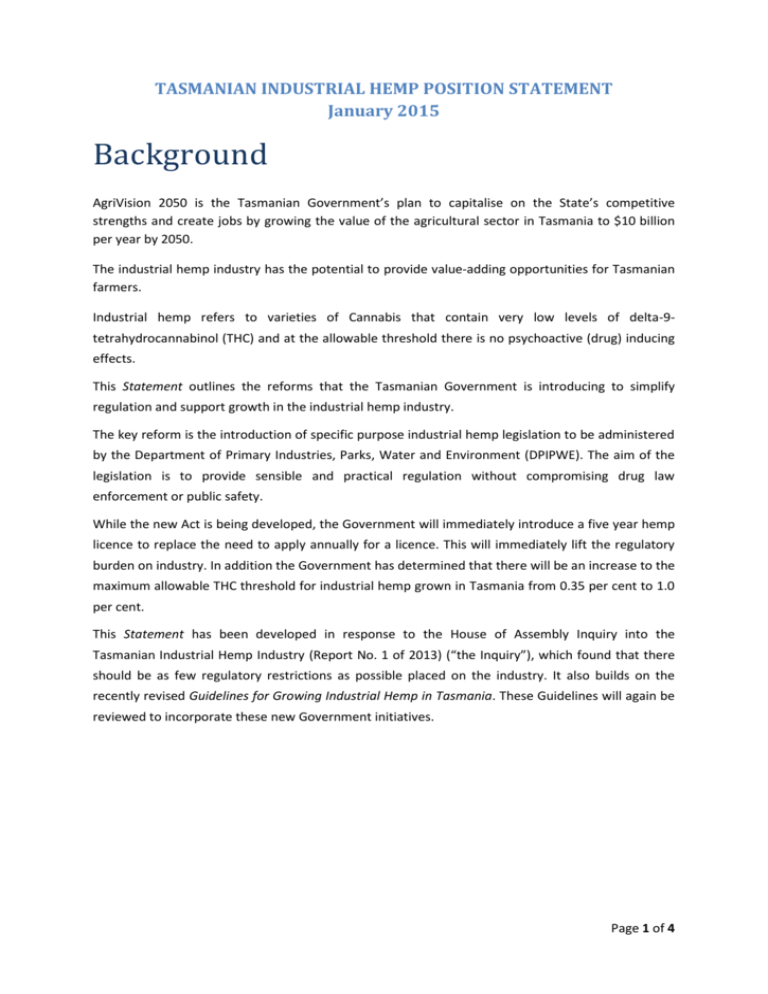
TASMANIAN INDUSTRIAL HEMP POSITION STATEMENT January 2015 Background AgriVision 2050 is the Tasmanian Government’s plan to capitalise on the State’s competitive strengths and create jobs by growing the value of the agricultural sector in Tasmania to $10 billion per year by 2050. The industrial hemp industry has the potential to provide value-adding opportunities for Tasmanian farmers. Industrial hemp refers to varieties of Cannabis that contain very low levels of delta-9tetrahydrocannabinol (THC) and at the allowable threshold there is no psychoactive (drug) inducing effects. This Statement outlines the reforms that the Tasmanian Government is introducing to simplify regulation and support growth in the industrial hemp industry. The key reform is the introduction of specific purpose industrial hemp legislation to be administered by the Department of Primary Industries, Parks, Water and Environment (DPIPWE). The aim of the legislation is to provide sensible and practical regulation without compromising drug law enforcement or public safety. While the new Act is being developed, the Government will immediately introduce a five year hemp licence to replace the need to apply annually for a licence. This will immediately lift the regulatory burden on industry. In addition the Government has determined that there will be an increase to the maximum allowable THC threshold for industrial hemp grown in Tasmania from 0.35 per cent to 1.0 per cent. This Statement has been developed in response to the House of Assembly Inquiry into the Tasmanian Industrial Hemp Industry (Report No. 1 of 2013) (“the Inquiry”), which found that there should be as few regulatory restrictions as possible placed on the industry. It also builds on the recently revised Guidelines for Growing Industrial Hemp in Tasmania. These Guidelines will again be reviewed to incorporate these new Government initiatives. Page 1 of 4 Improving the arrangements current licensing The Government will immediately introduce a new five year licence for growers, replacing the current one year licence. The following arrangements will apply: An initial inspection of the property by Tasmania Police (at their discretion) with assessment of any particular risks; A simple notification of planting each year; and A condition that states that the licence may be revoked if there is non-compliance with its conditions during the term of the licence. Until such time as new legislation is in place, licences will continue to be issued under the Poisons Act 1971 and administered by the Department of Health and Human Services. This role will be transferred to DPIPWE following the passing of the proposed new legislation. The Government will increase the maximum allowable THC threshold for industrial hemp grown in Tasmania from 0.35 per cent to 1.0 per cent. This will align Tasmania with New South Wales, Queensland and the Australian Capital Territory and will allow for easier trade and transfer of plant material between these jurisdictions. AgriGrowth Tasmania and the Department of Health and Human Services will also work with the hemp industry to determine whether there can be any further reforms to current licence conditions. Specific purpose legislation The House of Assembly Inquiry into the Tasmanian Industrial Hemp Industry recommended that DPIPWE would be the most appropriate body to regulate the industry. The Government concurs and will introduce special purpose legislation to regulate the cultivation and supply of industrial hemp for commercial production and other legitimate uses. The new Act will also introduce a licensing regime for research into industrial hemp varieties, including those that exceed the maximum allowable THC threshold. The new Act will ensure that the production can take place without risk to drug law enforcement. AgriGrowth Tasmania will work with the Department of Health and Human Services, Tasmania Police and stakeholder groups and industry on developing appropriate legislation for Tasmania, including implementation options. The Government’s intention is to introduce a Bill to Parliament by November 2015. Page 2 of 4 Why this approach The House of Assembly Inquiry into the Tasmanian Industrial Hemp Industry made multiple recommendations to simplify the regulatory framework for processing, growing and testing industrial hemp, including streamlining of THC thresholds across jurisdictions. This Statement addresses the key recommendation of the Inquiry to introduce specific purpose industrial hemp legislation to be administered by the Department of Primary Industries, Parks, Water and Environment. The development of specific purpose legislation will put the State in a position to adopt the majority of the Inquiry’s recommendations, and to further refine the licensing and regulatory system. The only recommendation from the Inquiry that is not supported by Government relates to the random testing of industrial hemp crops supported by an industry levy to fund the testing. This would not provide the level of scrutiny and absolute verification of THC levels that both the industrial hemp industry needs and/or that ensures there is no risk to drug law enforcement. Tasmania Police concurs with this view. It is important that the fledgling Tasmanian Industrial hemp industry establishes a reputation for high quality, sustainable and safe products, especially when the industry is ultimately targeting the human consumption food market. Therefore all crops will still need to be tested to ensure compliance with the maximum allowable THC threshold. Hemp in Food Human consumption of all cannabis products is currently prohibited under the Australia New Zealand Food Safety Code. Food Standards Australia New Zealand (FSANZ) supports the sale of food derived from hemp with low THC content as it is safe for human consumption at the recommended maximum levels of THC content; there are adequate controls in place to mitigate the risk of illicit cannabis products entering the market; and the approval should not have an impact on drug enforcement. FSANZ was also satisfied that consumer protection legislation in Australia and New Zealand that regulates misleading and deceptive conduct is sufficient to ensure that consumers are not at risk of being misled by food labelling or advertising potentially connecting hemp in foods with the psychoactive (drug) effects of other high THC varieties of cannabis. The ultimate decision on whether hemp in food will be allowed rests with the national ministers responsible for food regulation in Australia and New Zealand. The Tasmanian Government will continue to strongly advocate for Federal approval allowing industrial hemp products in food, and thus supports lifting the ban on hemp in food. Page 3 of 4 Why regulate Cannabis sativa comprises varieties that contain both high and low levels of the psychoactive substance, tetrahydrocannabinol (THC). It is the most commonly used illicit substance in Tasmania and is a prohibited plant in all States and Territories in Australia. Cannabis sativa is a prohibited plant under the Poisons Act 1971. Low THC Cannabis sativa or “industrial hemp” is permitted to be grown under licence. Cannabis sativa is also a controlled plant under the Misuse of Drugs Act 2001. This Act gives the police the ability to prosecute those cultivating Cannabis sativa without a licence but does not apply to industrial hemp crops licensed under the Poisons Act 1971 A key challenge in managing regulation of the sector is that there are over 200 different varieties of Cannabis sativa containing varying levels of THC. Many varieties are visually indistinguishable from each other meaning that the level of THC can only be determined by laboratory testing. There is also no guarantee that certified seed planted for industrial hemp will always grow a low THC crop. The Government will thus maintain the listing of Cannabis sativa under both of these Acts. All States and Territories that allow for the growing of industrial hemp do so through licensing arrangements. Tasmania will maintain this approach to the regulation of industrial hemp, but will continue to consider all opportunities to reform the conditions that apply to the industrial hemp industry. Effective date: January 2015 Page 4 of 4
